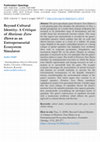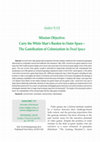Conference Presentations by Andrei Nae
Books by Andrei Nae

Routledge, 2021
This book investigates the narrativity of some of the most popular survival horror video games an... more This book investigates the narrativity of some of the most popular survival horror video games and the gender politics implicit in their storyworlds. In a thorough analysis of the genre that draws upon detailed comparisons with the mainstream action genre, Andrei Nae places his analysis firmly within a political and social context.
In comparing survival horror games to the dominant game design norms of the action genre, the author differentiates between classical and postclassical survival horror games to show how the former reject the norms of the action genre and deliver a critique of the conservative gender politics of action games, while the latter are more heterogeneous in terms of their game design and, implicitly, gender politics.
This book will appeal not only to scholars working in game studies, but also to scholars of horror, gender studies, popular culture, visual arts, genre studies and narratology.
https://www.routledge.com/Immersion-Narrative-and-Gender-Crisis-in-Survival-Horror-Video-Games/Nae/p/book/9780367894115

Editura Universităţii din Bucureşti, 2019
Can video games convey narrative meaning? What are the particular means employed by games to ‘tel... more Can video games convey narrative meaning? What are the particular means employed by games to ‘tell’ stories? If video games can render narratives, how do narratives across other media inform video games and how do games relate to various discourses and ideologies? The present book is an attempt to provide an answer to these questions. The first part of this book shows how recent approaches coming from cognitive narrative theory can be used to analyse video games as storytelling media. The second part is concerned with showing how the specific rhetoric of video games entertains a dialogue with literary texts and their respective ideologies. In order to achieve this, the present book investigates four horror games, F.E.A.R., Dead Space, Alien: Isolation, and Manhunt 2, in light of their relation to colonial discourse with focus on how literary texts such as Joseph Conrad’s Heart of Darkness shape the games’ storyworlds.
https://editura-unibuc.ro/en/produs/horror-video-games-as-procedural-narratives-extreme-colonial-encounters-in-the-digital-heart-of-darkness/
Book Chapters by Andrei Nae

Perspectives on Shakespeare in Europe's Borderlands, 2020
In recent years, online platforms such as YouTube have become a central locus for grass root inte... more In recent years, online platforms such as YouTube have become a central locus for grass root intertextual and adaptation practices aimed at appropriating a series of canonical works, including those of William Shakespeare. This chapter investigates the YouTube video “Othello (Shakespeare) – Thug Notes Summary & Analysis” as a vernacular Web 2.0 production with focus on the tension between the explicit educational purposes of the video and its fanfiction aesthetics. My inquiry shows that, in order to salvage its status as educational material, the video attempts to mitigate its radical appropriative retelling by relying on a conservative criticism of the play. The “Analysis” part of the video foregrounds a formalist conception of Shakespeare’s plays that is buttressed on the idea of a universal Shakespeare. The idea of universality legitimizes the retelling by implying that, if there is a stable Shakespeare outside the text, then this Shakespeare can be signified by other systems of signs, in particular, the conventions of user-generated videos.
https://editura-unibuc.ro/en/produs/perspectives-on-shakespeare-in-europes-borderlands/
Playing the Field: Video Games and American Studies, 2019

Shakespeare 400 in Romania. Papers Commemorating the 400th Anniversary of William Shakespeare's Death, 2017
This article analyses the relationship between Shakespeare's The Tempest and Rockstar's stealth s... more This article analyses the relationship between Shakespeare's The Tempest and Rockstar's stealth survival horror video game Manhunt 2. By relying on recent developments in adaptation studies, I establish that Manhunt 2 is both an appropriation and a commentary of its source that, on the one hand, sets the story of Miranda and Prospero into a new context, while, on the other hand, challenges the notion of authority as it is derived from the play. The game explores the theme of authority on various levels shifting from a textual to a hypotextual and metatextual one. In accordance with postmodern aesthetics, the game attempts a repurposing of Shakespeare's text that aims to undermine the authority of the canon, while at the same time self-reflexively commenting on the authority enjoyed by the game designer(s) in their relationship to the player.

Provocation as Art Proceedings of the 2nd Ekphrasis Conference: Provocation as Art. Scandal, Shock and Sexuality in Contemporary Visual Culture, 2015
This paper deals with representations of femininity in the horror themed first person shooter tri... more This paper deals with representations of femininity in the horror themed first person shooter trilogy, F.E.A.R. By relying on post-Freudian psychoanalysis and feminist film theory, I intend to highlight the way in which the representations of Alma, the main female antagonist, reflect a series of dominant patriarchal anxieties. The horror element of each game is based on a particular anxiety, such as the fear of maternal authority or female sexual agency. These anxieties are, however, not independent, since most, if not all of them, can be understood as embodiments of what Julia Kristeva called abjection. Consequently, my paper begins with an exposition of the critical method, and continues with three other sections, each dealing with an instalment of the trilogy. Since my aim is to analyse the visual representations of Alma, considerably less attention will be given to the ludic side of the video games, with the exception of the discussion of F.E.A.R. 3, where the choice of the avatar and player performance influence the outcome of the game and, therefore, have bearing on the overall psychoanalytic implications of the cultural product. Because I do not expect many of my readers to be familiar with the video games, I will provide a very brief synopsis of the plot in each section.
Articles by Andrei Nae

Borrowers and Lenders: The Journal of Shakespeare and Appropriation, 2022
This article analyses the manner in which two survival horror video games, Silent Hill 3 and Manh... more This article analyses the manner in which two survival horror video games, Silent Hill 3 and Manhunt 2, remediate Shakespeare in their attempts to gain the legitimacy of art in the former case or reject the association between video games and art in the latter case. Despite the radically different purposes behind the use of Shakespeare, the design of both games pays homage to a high-low culture distinction whereby Shakespeare's status as a symbol of elite British culture is confirmed. Not only is Shakespeare's canonical status reinforced, but the bard also benefits from these remediations by becoming accessible to a new audience, namely that of video game players. Because knowledge of Shakespeare can lead to a superior ludic or narrative experience of the games, familiarity with the plays is normalized. In this sense, Silent Hill 3 and Manhunt 2 serve the pedagogical function of "teaching" Shakespeare to their players. In spite of these similarities, the two remediations feature a series of traits that undermine their opposing goals. Silent Hill 3's remediation of Shakespeare is a materialist one that defies the Kantian aesthetics characterizing traditional artistic adaptations of Shakespeare. On the other hand, Manhunt 2, which strives to reassert its opposition to art, features a more traditional use of Shakespeare that employs The Tempest as a hypotext for its storyworld.

Transilvania, 2022
This article analyses the anti-communist rhetoric of the popular Ukrainian video game S.T.A.L.K.E... more This article analyses the anti-communist rhetoric of the popular Ukrainian video game S.T.A.L.K.E.R.: Shadow of Chernobyl which was developed by GSC Game World and released in 2007. In this paper I argue that, in order to mount a humanist critique against Soviet communism, the game borrows the anti-colonial discursive structure of Joseph Conrad's Heart of Darkness filtered through the video game F.E.A.R. If colonialism is predicated on the juxtaposition of territorial expansion and a progressive temporality towards a civilizational ideal, then Heart of Darkness and F.E.A.R. convey a critique of colonialism by highlighting how spatial progress brings about temporal regression manifested as a dissolution of the self. To show this, they employ the doppelgänger convention. Both protagonists representing white civilization are on quest to find a character who has been 'contaminated' by the 'heart of darkness.' This latter character is eventually revealed to be a negative cultural doppelgänger of the protagonist who has assimilated otherness to the point of no return. By the same token, in S.T.A.L.K.E.R.: Shadow of Chernobyl the psychological regression of the protagonist is mapped onto spatial progress towards the heart of communism, in this case Reactor #4 of the Chernobyl Nuclear Power Plant. S.T.A.L.K.E.R. reworks the doppelgänger convention by identifying the protagonist with the character 'gone native,' i.e. gone communist, not only symbolically, but also physically. This enables the game to put forth two scenarios, namely one where the main character overcomes communism, and one where he embraces it. By offering both endings, the game maintains two contradictory views on the communist past. One ending suggests that communism can eventually be overcome, while the other postulates the communist past is here to stay.

Postmodern Openings, 2020
The post-apocalyptic game Horizon: Zero Dawn is a role-playing game that simulates the adventures... more The post-apocalyptic game Horizon: Zero Dawn is a role-playing game that simulates the adventures of Aloy, a female protagonist, in a world where human civilization has returned to its premodern stage of development and the world’s fauna has mysteriously become robotic. The cause for this regress into premodernity is revealed by the game’s embedded narrative which explains that life on earth had almost become extinct as a result of a military AI going rogue. Implicit in the game’s embedded narrative is a strong critique of global capitalism that highlights how neoliberal ideas such as corporate governance, deregulation, and automation imperil life on the planet. Despite its critique, gameplay is structured on the very principles that the game’s narrative claims to reject. The world of Horizon: Zero Dawn simulates an entrepreneurial ecosystem in which the player must identify opportunities and manage resources in such a manner as to successfully beat the game. The in-game economy encourages the accumulation of natural resources and features no in-built mechanic to account for the environmental consequences of the playable character’s actions, notwithstanding the environmental critique of the game’s narrative. This article argues that, contrary to its scripted narrative, Horizon: Zero Dawn naturalizes capitalism by means of its procedural rhetoric. I further argue that the overt critique of capitalism diverts the player’s attention from the capitalist principles that support gameplay, thus, paradoxically, consolidating the ideological nature of gameplay. The game’s endorsement of capitalism dovetails with a meritocratic worldview which inflects the game’s approach to cultural identity and diversity.

English Literature, 2019
This article focuses on the recent film adaptation of the 2013 Tomb Raider video game. Its main g... more This article focuses on the recent film adaptation of the 2013 Tomb Raider video game. Its main goal is to show that, despite the significant changes that the plot undergoes when transitioning from video game to feature film, the adaptation remains faithful to the conservative gender politics of its ludic source text, in the sense that in both the game and the film Lara must struggle to maintain patriarchal order. While in the game the female protagonist has to fulfil her late father's unfinished archaeological (in fact colonial) project and redeem his name, in the film she has to compensate for her father's masculinity crisis. The resolution of the plot coincides with a resolution of the crisis of masculinity, which reinstates the gender power relations privileging masculinity. Furthermore, this article shows that Lara's struggle to re-establish patriarchy in the film's storyworld coerces her to adopt a colonial attitude with respect to otherness. By performing phallic masculinity, Lara Croft acts as an agent of colonialism whose intervention in foreign territories and cultures is rendered by the film providential for the emancipation of the native populations.
Acta Universitatis Sapientiae Film and Media Studies, 2019
The present article analyses the manner in which AAA action-adventure games adapt, quote, and ref... more The present article analyses the manner in which AAA action-adventure games adapt, quote, and reference Shakespeare's plays in order to borrow the bard's cultural capital and assert themselves as forms of art. My analysis focuses on three major releases: Metal Gear Solid 4: Guns of the Patriots, BioShock: Infinite, and God of War. The article shows that these games employ narrative content from Shakespeare's plays in order to adopt traits traditionally associated with the established arts, such as narrative depth and complex characters. In addition to this, explicit intertextual links between the games' respective storyworlds and the plays are offered as ludic rewards for the more involved players who thoroughly explore game space.

English Literature: Theories, Interpretations, Contexts, 2018
In the past two decades, the rejection of the fidelity criterion has led to the release of a mult... more In the past two decades, the rejection of the fidelity criterion has led to the release of a multitude of films that rework and appropriate canonical literary works to suit local political goals. The works of William Shakespeare have been some of the main beneficiaries of this new direction, as indicated by the significant number of appropriations, remediations, and ‘tradaptations’ (translations-adaptations) that have turned Shakespeare into a global figure. In this article I focus on two film adaptations of Othello, O (Nelson, 2001) and Omkara (Bhardwaj, 2006), that recontextualize the play’s narrative content into two different settings at the turn of the millennia: the American South and India. My aim is to highlight the manner in which the two films repurpose the content of the play in order to reveal the tensions that mark the two local cultures. Early modern concerns such as miscegenation, female sexuality, and religious and racial otherness are appropriated and represented along new cultural coordinates that reflect the anxieties of the two new local cultures. For example, in O, the issue of miscegenation is translated in accordance with the racism that marks the conservative American South, while in Omkara miscegenation is translated as the conflict between two Indian views on marriage: the traditional one that advocates arranged marriages, and the modern one that supports love marriages.

Ekphrasis, 2018
Survival horror video games were recognized in the late nineteen-nineties for their cumbersome ga... more Survival horror video games were recognized in the late nineteen-nineties for their cumbersome gameplay determined by complicated controls and inefficient core mechanics. After 2005, survival horror games started to move away from their traditional game design and to show more openness to the dominant game design norms of the action genre. The new survival horror games sought to eliminate the hypermedial elements that had characterized their predecessors and offer gamers an immersive gameplay experience similar to that of AAA action games. In this article I look at the survival horror game Dead Space (EA, 2008) and analyse the way in which the game naturalizes its ludic functions in order to strengthen the illusion of immersion and how the illusion of immersion strengthens the ideology of white supremacy embedded in the remediated colonial discourse of the game. In keeping with Jesper Juul's approach (" On Absent Carrot Sticks ") to the relation between the game's fiction and the game's rules, I show that in the case of Dead Space traditionally antimimetic elements of video games such as the heads-up display are implemented into the fictional text-actual-world. As a result, conventionally extradiegetic game mechanics such as the inventory now become intradiegetic elements that no longer draw the player away from the storyworld. The realism of the storyworld works in favour of a naturalization of the colonial tropes that the video game remediates.

Volume 13, No. 1 "Media Entanglements and the Senses", 2016
This paper inspects the concept of immersion in video games as a gradient category resulting from... more This paper inspects the concept of immersion in video games as a gradient category resulting from the degrees of interactivity and immediacy. By factoring in the objective technological affordances of media, as well as the subjective impression that these affordances help create, and the culturally constructed nature of gameplay experience, I argue that high degrees of interactivity and immediacy are not achieved solely by giving the player more freedom of action, and, respectively, by inflecting the content of the narrative as little as possible with the medium's specific narrative affordances. Quite on the contrary, it is necessary that freedom be limited and content be manipulated for the video game to have high degrees of narrativity and playability, thus ensuring player engagement. In the absence of player engagement, the mediated nature of gaming experience becomes obvious and the level of immersion decreases. In the last section, I explore the relationship between video games and film and point out the consequences the remediation of film has regarding the level of immediacy.
[Intre]sections, Dec 1, 2015
This paper analyses pornographic representations of sex and attitudes with respect to homosexuali... more This paper analyses pornographic representations of sex and attitudes with respect to homosexuality in Game of Thrones. By relying on what Astrid Erll calls a media conscious approach to cultural memory, I hope to link the pornographic conventions used when filming sex with the memory of the civilizing mission, and the stigmatization of homosexuality with the memory of the early modern negative stereotype about the regions around the Mediterranean. In the former case I am interested in the way the film repurposes pornography in order to shed light upon the shifts in the power relations between Kahl Drogo, the Dothraki leader and Daenerys Targaryen, his wife from Westeros, while in the latter I am interested in the way homosexuality is used as a marker of difference and decadence for Doren, the extreme southern part of Westeros.

The Second World War brought an end to colonization and, along with it,
a series of demographic c... more The Second World War brought an end to colonization and, along with it,
a series of demographic changes to the countries of Europe. The great number of
immigrants, exiles and refugees grew to the extent that the very understanding of
nation changed and the transnational margin-centre relationship was reversed. The
Other, more than ever before, became part and parcel of the identity of any Western
European nation that had had a colonial empire. In the present essay I shall
endeavour to give an account of these changes in post-colonial Britain and later
discuss two seminal novels against the background of a continent that had
relinquished the ideals of the Enlightenment. My essay will focus on the
ambivalent cultural conquering of the centre by the immigrant margin as displayed
in Hanif Kureishi’s The Buddha of Suburbia and Amitav Gosh’s The Shadow Lines.
My claim is that while in the first novel the margin has to undergo a process of selforientalization
in order to reach the centre, in the latter’s case, it is the centre that
has to adapt to the oriental vista, thus undergoing a process of occidentalization.
Volume XVI, No. 2
The present paper aims to shed light upon the perpetuation of the power relations between former ... more The present paper aims to shed light upon the perpetuation of the power relations between former centres and former colonies in today's post-colonial world as reflected in the short story The Interpreter of Maladies by JhumpaLahiri. My claim is that tourism maintains the cultural hegemony of the former metropolises by having former colonies, which are now tourist destinations, enact the images constructed by tourist agencies. In order to rise to the culturally constructed expectations of the westerner, tourist guides have to provide tourists with domesticated translations of their homelands and native culture, thus submitting to the cultural prestige of the former metropolises.

Annals of the University of Bucharest - 2015, No.2, 2015
The present paper attempts to place Joseph Conrad’s canonical work, “Heart of Darkness”, in the c... more The present paper attempts to place Joseph Conrad’s canonical work, “Heart of Darkness”, in the context of its contemporary ideological debate concerning imperialism. The novel overtly manifests a sceptical attitude with respect to any practice of imperialism, as
conceived either by corporate capitalism based on racialist thinking, or egalitarian socialism based on humanism. Contrary to the scepticism pervading the novel, both Marlow’s deeds and the representations of African otherness seem to work against the overt refutation of imperialism. Marlow is an employee of an imperialist company throughout most of the novel, while the images
of native Africans fall back on dominant negative stereotypes. As a result, even if judged on its
own terms, or according to present-day rhetorical sensitivities, “Heart of Darkness” itself seems
unable to live up to its anti-imperialist intentions.
The present article deals with a topic that to a certain extent seems to have
been eschewed by Em... more The present article deals with a topic that to a certain extent seems to have
been eschewed by Emily Dickinson scholars, namely that of the influence European
theology has had on the religious poetry written in America. In the
light of these influences, works, which may seem highly cryptic, gain a new
understanding that eventually provides solutions to what might have been
regarded as unsolvable conundrums. In my article I seek to give an account
of why in a poetry that describes with minute attention each step of a funeral
precisely the funeral is missing. In order to achieve this goal I shall shed light
upon how St. Augustine’s understanding of the passions influenced Emily
Dickinson through Calvin and explain that in fact the apparently illogic decision
to leave out the event around which the poem was constructed is a sign
of conceptual consistency.










Uploads
Conference Presentations by Andrei Nae
Books by Andrei Nae
In comparing survival horror games to the dominant game design norms of the action genre, the author differentiates between classical and postclassical survival horror games to show how the former reject the norms of the action genre and deliver a critique of the conservative gender politics of action games, while the latter are more heterogeneous in terms of their game design and, implicitly, gender politics.
This book will appeal not only to scholars working in game studies, but also to scholars of horror, gender studies, popular culture, visual arts, genre studies and narratology.
https://www.routledge.com/Immersion-Narrative-and-Gender-Crisis-in-Survival-Horror-Video-Games/Nae/p/book/9780367894115
https://editura-unibuc.ro/en/produs/horror-video-games-as-procedural-narratives-extreme-colonial-encounters-in-the-digital-heart-of-darkness/
Book Chapters by Andrei Nae
https://editura-unibuc.ro/en/produs/perspectives-on-shakespeare-in-europes-borderlands/
Articles by Andrei Nae
a series of demographic changes to the countries of Europe. The great number of
immigrants, exiles and refugees grew to the extent that the very understanding of
nation changed and the transnational margin-centre relationship was reversed. The
Other, more than ever before, became part and parcel of the identity of any Western
European nation that had had a colonial empire. In the present essay I shall
endeavour to give an account of these changes in post-colonial Britain and later
discuss two seminal novels against the background of a continent that had
relinquished the ideals of the Enlightenment. My essay will focus on the
ambivalent cultural conquering of the centre by the immigrant margin as displayed
in Hanif Kureishi’s The Buddha of Suburbia and Amitav Gosh’s The Shadow Lines.
My claim is that while in the first novel the margin has to undergo a process of selforientalization
in order to reach the centre, in the latter’s case, it is the centre that
has to adapt to the oriental vista, thus undergoing a process of occidentalization.
conceived either by corporate capitalism based on racialist thinking, or egalitarian socialism based on humanism. Contrary to the scepticism pervading the novel, both Marlow’s deeds and the representations of African otherness seem to work against the overt refutation of imperialism. Marlow is an employee of an imperialist company throughout most of the novel, while the images
of native Africans fall back on dominant negative stereotypes. As a result, even if judged on its
own terms, or according to present-day rhetorical sensitivities, “Heart of Darkness” itself seems
unable to live up to its anti-imperialist intentions.
been eschewed by Emily Dickinson scholars, namely that of the influence European
theology has had on the religious poetry written in America. In the
light of these influences, works, which may seem highly cryptic, gain a new
understanding that eventually provides solutions to what might have been
regarded as unsolvable conundrums. In my article I seek to give an account
of why in a poetry that describes with minute attention each step of a funeral
precisely the funeral is missing. In order to achieve this goal I shall shed light
upon how St. Augustine’s understanding of the passions influenced Emily
Dickinson through Calvin and explain that in fact the apparently illogic decision
to leave out the event around which the poem was constructed is a sign
of conceptual consistency.
In comparing survival horror games to the dominant game design norms of the action genre, the author differentiates between classical and postclassical survival horror games to show how the former reject the norms of the action genre and deliver a critique of the conservative gender politics of action games, while the latter are more heterogeneous in terms of their game design and, implicitly, gender politics.
This book will appeal not only to scholars working in game studies, but also to scholars of horror, gender studies, popular culture, visual arts, genre studies and narratology.
https://www.routledge.com/Immersion-Narrative-and-Gender-Crisis-in-Survival-Horror-Video-Games/Nae/p/book/9780367894115
https://editura-unibuc.ro/en/produs/horror-video-games-as-procedural-narratives-extreme-colonial-encounters-in-the-digital-heart-of-darkness/
https://editura-unibuc.ro/en/produs/perspectives-on-shakespeare-in-europes-borderlands/
a series of demographic changes to the countries of Europe. The great number of
immigrants, exiles and refugees grew to the extent that the very understanding of
nation changed and the transnational margin-centre relationship was reversed. The
Other, more than ever before, became part and parcel of the identity of any Western
European nation that had had a colonial empire. In the present essay I shall
endeavour to give an account of these changes in post-colonial Britain and later
discuss two seminal novels against the background of a continent that had
relinquished the ideals of the Enlightenment. My essay will focus on the
ambivalent cultural conquering of the centre by the immigrant margin as displayed
in Hanif Kureishi’s The Buddha of Suburbia and Amitav Gosh’s The Shadow Lines.
My claim is that while in the first novel the margin has to undergo a process of selforientalization
in order to reach the centre, in the latter’s case, it is the centre that
has to adapt to the oriental vista, thus undergoing a process of occidentalization.
conceived either by corporate capitalism based on racialist thinking, or egalitarian socialism based on humanism. Contrary to the scepticism pervading the novel, both Marlow’s deeds and the representations of African otherness seem to work against the overt refutation of imperialism. Marlow is an employee of an imperialist company throughout most of the novel, while the images
of native Africans fall back on dominant negative stereotypes. As a result, even if judged on its
own terms, or according to present-day rhetorical sensitivities, “Heart of Darkness” itself seems
unable to live up to its anti-imperialist intentions.
been eschewed by Emily Dickinson scholars, namely that of the influence European
theology has had on the religious poetry written in America. In the
light of these influences, works, which may seem highly cryptic, gain a new
understanding that eventually provides solutions to what might have been
regarded as unsolvable conundrums. In my article I seek to give an account
of why in a poetry that describes with minute attention each step of a funeral
precisely the funeral is missing. In order to achieve this goal I shall shed light
upon how St. Augustine’s understanding of the passions influenced Emily
Dickinson through Calvin and explain that in fact the apparently illogic decision
to leave out the event around which the poem was constructed is a sign
of conceptual consistency.
https://editura-unibuc.ro/en/produs/shakespeare-400-in-romania-papers-commemorating-the-400th-anniversary-of-william-shakesperares-death/